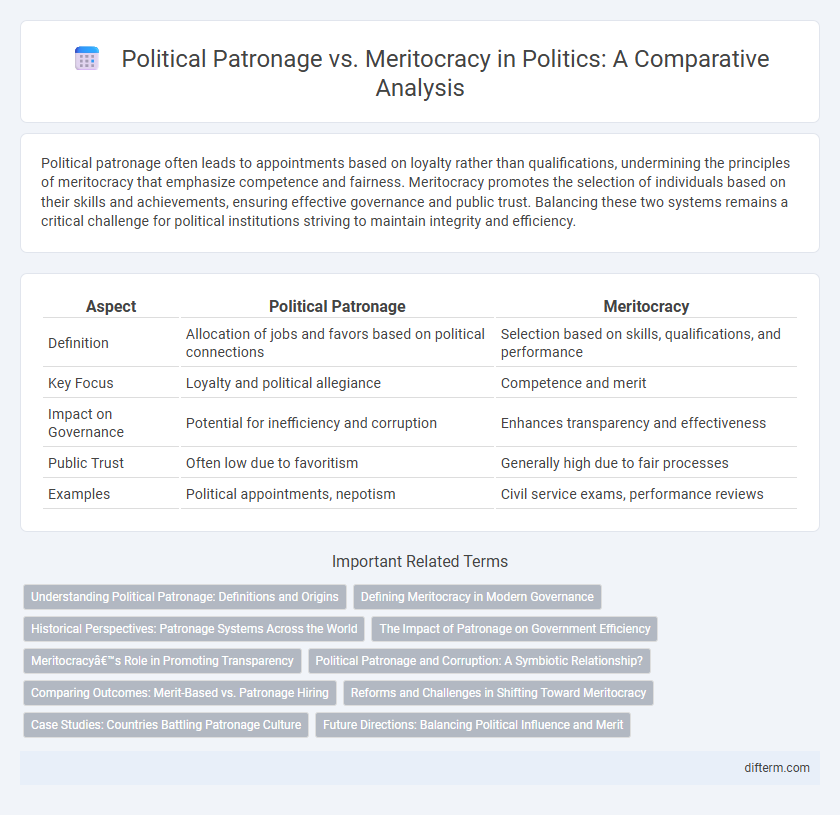Political patronage often leads to appointments based on loyalty rather than qualifications, undermining the principles of meritocracy that emphasize competence and fairness. Meritocracy promotes the selection of individuals based on their skills and achievements, ensuring effective governance and public trust. Balancing these two systems remains a critical challenge for political institutions striving to maintain integrity and efficiency.
Table of Comparison
| Aspect | Political Patronage | Meritocracy |
|---|---|---|
| Definition | Allocation of jobs and favors based on political connections | Selection based on skills, qualifications, and performance |
| Key Focus | Loyalty and political allegiance | Competence and merit |
| Impact on Governance | Potential for inefficiency and corruption | Enhances transparency and effectiveness |
| Public Trust | Often low due to favoritism | Generally high due to fair processes |
| Examples | Political appointments, nepotism | Civil service exams, performance reviews |
Understanding Political Patronage: Definitions and Origins
Political patronage, also known as the spoils system, involves awarding government jobs and favors to supporters, friends, and loyalists rather than based on qualifications. This practice has roots in ancient civilizations but sharply contrasted with meritocracy, which emphasizes appointments by ability and performance through competitive exams or evaluations. Understanding the origins of political patronage reveals its role in consolidating power and maintaining political loyalty while often undermining administrative efficiency and fairness.
Defining Meritocracy in Modern Governance
Meritocracy in modern governance emphasizes selecting and promoting individuals based on talent, qualifications, and performance rather than political loyalty or personal connections. This approach fosters efficiency, transparency, and accountability by ensuring that public officials are competent and capable of addressing complex policy challenges. Implementing meritocratic principles reduces corruption and patronage, ultimately strengthening democratic institutions and public trust.
Historical Perspectives: Patronage Systems Across the World
Political patronage systems have historically shaped governance structures by favoring loyalty and personal relationships over qualifications, as seen in ancient Rome's clientela networks and the spoils system in 19th-century United States politics. These systems often prioritized distributing government jobs and favors to supporters, which contrasted sharply with meritocratic principles emphasizing competence and merit-based advancement. Despite modern reforms, remnants of patronage persist globally, influencing political stability and public administration efficiency.
The Impact of Patronage on Government Efficiency
Political patronage often undermines government efficiency by prioritizing loyalty over qualifications, resulting in less competent public officials and reduced bureaucratic effectiveness. Meritocracy emphasizes hiring based on skills and performance, leading to improved policy implementation and administrative competence. Studies show that governments with merit-based systems tend to have higher productivity, greater public trust, and enhanced service delivery compared to those relying on patronage.
Meritocracy’s Role in Promoting Transparency
Meritocracy fosters transparency in politics by prioritizing qualifications and competence over connections, reducing opportunities for corruption and favoritism. Transparent merit-based systems ensure public officials are accountable and decisions are grounded in objective criteria. This approach enhances trust in government institutions and promotes fair resource allocation.
Political Patronage and Corruption: A Symbiotic Relationship?
Political patronage often fosters corruption by enabling the allocation of public resources and positions based on loyalty rather than merit, creating a cycle of favoritism and inefficiency. This symbiotic relationship undermines meritocratic principles, weakening institutional integrity and eroding public trust in governance. Studies indicate that political patronage networks facilitate rent-seeking behaviors, significantly impeding democratic accountability and economic development.
Comparing Outcomes: Merit-Based vs. Patronage Hiring
Merit-based hiring prioritizes qualifications, skills, and performance, leading to efficient and competent public service that fosters trust and transparency in government institutions. Political patronage, often rooted in loyalty and favoritism, tends to result in inefficiency, corruption, and weakened accountability, undermining democratic governance. Studies consistently show that meritocratic systems enhance policy implementation and public satisfaction by promoting expertise and fairness in political appointments.
Reforms and Challenges in Shifting Toward Meritocracy
Political patronage often entrenches favoritism and undermines institutional efficiency, posing significant challenges to merit-based reforms. Efforts to shift toward meritocracy involve implementing transparent recruitment processes and performance-based evaluations, yet resistance from entrenched political networks hinders progress. Sustained reform requires robust anti-corruption measures and legal frameworks that prioritize competency over political loyalty.
Case Studies: Countries Battling Patronage Culture
Countries such as India and Nigeria highlight the persistent challenges of political patronage, where appointments and resources are often allocated based on loyalty rather than competence, undermining governance and public trust. In contrast, Singapore's meritocratic system emphasizes transparent recruitment and promotion based on merit, contributing to efficient public administration and economic growth. These contrasting case studies underscore the critical impact of governance structures on national development and social equity.
Future Directions: Balancing Political Influence and Merit
Future political strategies must prioritize transparent merit-based appointments to enhance governance quality while acknowledging the entrenched role of patronage in building party loyalty and mobilizing support. Implementing hybrid models that integrate objective performance metrics alongside strategic political considerations can foster accountability without alienating key stakeholders. Advancements in digital monitoring and public participation tools offer promising avenues to recalibrate the balance between political influence and meritocracy in administrative decisions.
political patronage vs meritocracy Infographic

 difterm.com
difterm.com